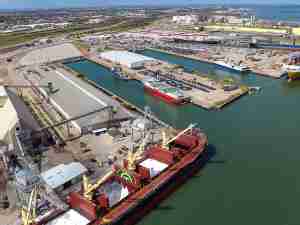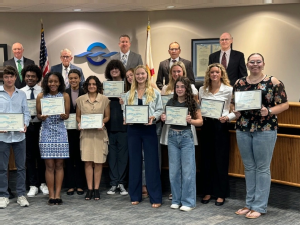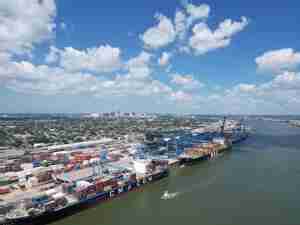The National Association of Waterfront Employers (NAWE) applauded the introduction of H.R. 4993 which would expand eligibility to allow funds deposited in a Capital Construction Fund (CCF) to acquire cargo handling equipment (CHE). The proposed bipartisan legislation, introduced by Reps. Mike Ezell (R-Miss.) and Troy Carter (D-La.), would allow Marine Terminal Operators (MTOs) to deposit a portion of their taxable operating income into a CCF account and use those funds on a tax deferred basis to maximize purchasing power for zero and near-zero cargo handling equipment (CHE). This legislation would promote the revitalization of the U.S. manufacturing base to create U.S. jobs as well provide a safer work environment for the waterfront workforce.
For over fifty years, the CCF program has played a crucial role in financing the construction of various commercial vessels engaged in the U.S. international and limited domestic trades. Last year, Congress expanded the use of CCFs to make eligible the acquisition, construction or reconstruction of vessels engaged in the U.S. coastwise trade, including all classes of vessels working in the domestic oil and gas industry and tugs and barges engaged in the transportation of U.S. agricultural cargoes on America’s inland waterways. The new proposed legislative amendment, drafted in partnership with NAWE and its members, aims to leverage the program's success to benefit the maritime sector and promote sustainable economic and supply chain development.
NAWE seeks to improve the CCF tax deferral program by allowing marine terminal operators (MTOs) to deposit:
• taxable income from managing U.S. marine terminals,
• the decrease or depreciation in value of their cargo handling equipment,
• capital earned from selling such equipment, and
• the earnings on the money saved in the program.
Additionally, the amendment proposes that MTOs should be able to withdraw money from the program without paying taxes if they use the funds to buy, build, repair, or pay off debt related to CHE and supporting infrastructure. By providing these tax deferral opportunities, the proposal will enable MTOs to more quickly modernize their equipment and infrastructure, create new American longshore and manufacturing job opportunities, and enhance marine terminal efficiency and global competitiveness.
"Our legislation helps modernize the infrastructure at America's ports and harbors and strengthens our supply chains,” said Congressman Ezell. “At the same time, it will support economic growth both at our ports in South Mississippi and in manufacturing across our state. I'm grateful to Congressman Carter for partnering with me on this common-sense legislation."
“I’m proud to lead the bipartisan H.R. 4993 with Congressman Ezell. These improvements to the CCF will allow for MTOs to have more leeway and leverage over their operation, giving them more opportunity to create good jobs and promote environmental sustainability on our waterways. This will give waterfront employees, coastal communities, and port economies the resources they need to succeed,” said Congressman Troy A. Carter, Sr.
“NAWE’s members are thrilled to see bipartisan legislation introduced that supports marine terminal operators around the country who are committed to providing a healthy and safe work environment. MTOs make large capital investments in specialized cargo handling equipment that is operated by dedicated waterfront workers and built by highly skilled labor in small, rural towns across the country. This legislation will support economic growth and create domestic manufacturing jobs from coast to coast. NAWE calls on Congress to support the proposed amendment to CCF to include cargo handling equipment,” said NAWE President Rob Murray.
NAWE welcomes the support of the House Transportation and Infrastructure Committee, the Senate Committee on Commerce, Science, and Transportation and all maritime industry stakeholders to ensure this legislation is passed by Congress and signed into law.










